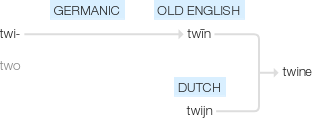Twine
Old English twīn ‘thread, linen’, from the Germanic base of twi- ‘two’; related to Dutch twijn .
wiktionary
From Middle English twyn, twyne, twin, from Old English twīn(“double thread, twist, twine, linen-thread, linen”), from Proto-West Germanic *twiʀn(“thread, twine”), from Proto-Indo-European *dwisnós(“double”), from *dwóh₁(“two”).
From Middle English twinen, twynen, from Old English *twīnian(“to twine, thread”), from Proto-Germanic *twiznōną(“to thread”), from Proto-Indo-European *dwisnós(“double”), from Proto-Indo-European *dwóh₁(“two”). Cognate with Dutch twijnen(“to twine, contort, throw”), Danish tvinde(“to twist”), Swedish tvinna(“to twist, twine, throw”), Icelandic tvinna(“to merge, twine”).
twine (third-person singular simple present twines, present participle twining, simple past and past participle twined)
etymonline
twine (n.)
"strong thread made from twisted strands," Old English twin "double thread," from Proto-Germanic *twiznaz "double thread, twisted thread" (source also of Dutch twijn, Low German twern, German zwirn "twine, thread"), from PIE root *dwo- "two."
twine (v.)
"to twist strands together to form twine," c. 1300, from twine (n.) and probably also from Old Norse tvinna "to double." Sense of "to twist around something" (as twine does) is recorded from late 14c. Related: Twined; twining.
